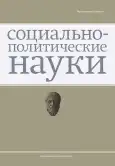On the issue of modeling the influence of bauman’s “fluidity” on the political process
- Авторлар: Bakov A.A.1
-
Мекемелер:
- Ural Federal University named after the first President of Russia B.N. Yeltsin
- Шығарылым: Том 13, № 2 (2023)
- Беттер: 21-29
- Бөлім: Political Institutions, Processes and Technologies
- URL: https://bakhtiniada.ru/2223-0092/article/view/145517
- DOI: https://doi.org/10.33693/2223-0092-2023-13-2-21-29
- ID: 145517
Дәйексөз келтіру
Аннотация
The relevance of the study is determined by the need to understand the dynamics of political processes depending on demographic changes in society. Based on the theoretical foundations of Z. Bauman’s ideas about “fluid modernity” and achievements in the field of molecular dynamic modeling, the author aims to calculate the “coefficient of political viscosity” of society based on its demographic indicators. Without claiming the exclusivity and universality of the proposed model, which does not take into account other factors other than family ties between people, the author admits a high probability of deviations in the accuracy of forecasting political processes and emphasizes the limited scope of the proposed model. The methodological basis of the article is the theoretical developments of Russian and foreign researchers. The work uses general philosophical, socio-humanitarian, as well as methods from the arsenal of physical, mathematical and chemical sciences. The empirical data used in the work are taken from open sources.
Негізгі сөздер
Толық мәтін
##article.viewOnOriginalSite##Авторлар туралы
Anton Bakov
Ural Federal University named after the first President of Russia B.N. Yeltsin
Хат алмасуға жауапты Автор.
Email: bakov1965@mail.ru
ORCID iD: 0009-0007-4082-9373
Candidate of Engineering; candidate at the Department of Political Sciences of the Ural Federal University named after the first President of Russia B.N. Yeltsin. Yekaterinburg, Russian Federation.
Ресей, YekaterinburgӘдебиет тізімі
- Bauman Z. Fluid modernity. St. Petersburg: Piter, 2008. 240 p.
- Goldstone J. Towards the theory of the fourth generation revolution. Logos. 2006. No. 5 (56). Pp. 58–103. (In Rus.)
- Damier V. Atomization of society and social self-organization: The Russian context. In: Workers in Russia: Historical experience and current situation. D. Churakov (ed.). Moscow: Editorial URSS, 2004. Pp. 73–82.
- Isakov A.S. Political modernization in the countries of the Islamic East: Conceptual genesis. Izvestiya Ural Federal University. Ser. 3: Social sciences. 2017. Vol. 12. No. 1 (161). Pp. 79–92.
- Kaplan I.G. Introduction to the theory of intermolecular interactions. Moscow: Nauka. The Main Edition of the Physical and Mathematical Literature, 1982. 312 p.
- Kerimov A.A. What do we know about the culture and nature of political power? In: Culture and the nature of political power: theory and practice: Collection of scientific papers. Yekaterinburg: Ural University Publishing House, 2022. Pp. 8–10.
- Mariten Zh. Man and the state. Moscow: Idea-Press, 2000. 196 p.
- Nefedov S.A. “Youth hill” and the first Russian Revolution. Sociological Research. 2015. No. 7. Pp. 140–147. (In Rus.)
- Polybius. Universal history in 3 volumes. St. Petersburg: Nauka. Vol. 1, 2005. 496 p.
- Smakotina N.L. Global social transformations in the context of demographic changes and urbanization. Acta Biomedica Scientifica. 2022. No. 7 (3). Pp. 47–56. (In Rus.)
- Bauman Z. Liquid modernity. Cambridge: Polity Press, 2000. 232 p.
- Géopolitique. 2001. No. 74. Р. 3.
- Green M.S. J. Brownian models in the gas no interacting molecules. Journal of Chemical Physics. 1951. No. 19. P. 1036.
- Haines M. Fertility and mortality in the united states. EH. Net Encyclopedia. R. Whaples (ed.). March 19, 2008. URL: http://eh.net/encyclopedia/fertility-and-mortality-in-the-united-states/
- Kubo R. Statistical-mechanical theory of irreversible processes. I. General theory and simple applications to magnetic and conduction problems. Journal of the Physical Society of Japan. 1957. No. 12. Pp. 570–586.
- Urdal H. A clash of generations? Youth bulges and political violence. International Studies Quarterly. 2006. Vol. 50. Issue 3. Pp. 607–629.
- Korea marks first-ever decline in registered population. Korea Joong Ang Daily. January 3, 2021. URL: https://koreaJoongAngdaily.joins.com/2021/01/03/national/socialAffairs/population-decline-korea-aging-society/20210103165800619.html
- Niger Total fertility rate. CIA World Factbook. September 18, 2021. URL: https://www.indexmundi.com/niger/total_fertility_rate.html
Қосымша файлдар












